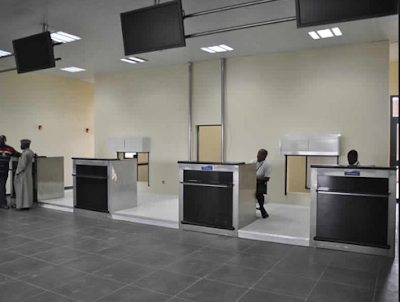Nigeria’s Minister of State for Aviation, Senator Hadi
Sirika, has unveiled the country’s new national flag carrier, Nigeria Air, due
to be launched in December this year.
Revealing the branding at the Farnborough International
Airshow, the Senator from the Federal Government of Nigeria, said in a
statement: “I am very pleased to tell you that we are finally on track to launching
a new national flag carrier for our country: Nigeria Air. We are all fully
committed to fulfilling the campaign promise made by our President, Muhammadu
Buhari in 2015.”
The airline will be run through a Public-Private Partnership
(PPP) arrangement and will have the support of the government, but Senator
Sirika stressed that the government will not own more than 5% of the carrier
and will not be involved in the running of the airline.
While the Senator did not reveal what aircraft the airline
will be flying, the Government of Nigeria tweeted that the airline is speaking
to Boeing and Airbus in negotiations. Senator Sirika hinted that an
announcement will be made soon.
Out of 1,500 possible routes considered, Senator Sirika said
they have selected 81 for the airline’s network, split into 40 domestic and
regional routes and the remaining 41 to be international.
The airline has recently obtained its Certificate of
Compliance from the Nigerian Infrastructure Concession Regulatory Commission
(ICRC) and will now search for investors.
Senator Sirika said: “I am confident that we will have a
well-run national flag carrier, a global player, compliant to international
safety standards, one which has the customer at its heart. An airline that
communicates the essence of our beautiful country, an airline we can all be
proud of.”
The Senator told the press conference that they want to make
a statement with the airline of “Yes we can do it” as well as promoting
the culture and traditions of the country.
The branding and naming was developed following a social
media campaign encouraging Nigerian youth and students to submit a name for the
new flag carrier, with over 400,000 people engaging with the campaign.
The Ministry of Transportation (Aviation) also commissioned
market research across the country including with aviation stakeholders,
politicians, Nigerian business owners, which concluded: “People are hungry for
a unifying national flag carrier.”
The national carrier is part of the Ministry of Transport
(Aviation)’s road map which also includes airport concessions, a Maintenance,
Repair and Overhaul facility centre and an aircraft leasing company.
The Nigerian Government will support the launch of the flag
carrier with viability gap funding. In a statement it said the flag carrier
will be: “Guided by the international ICAO standards, that will stand the IOSA
audit from the start, and lead to a fast IATA membership for international
operation.”













